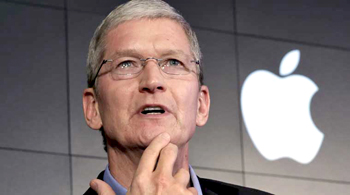Los Angeles, Jan 7: iPhone maker Apple has cut its CEO Tim Cook's salary by a whopping 15 per cent for 2016 as annual sales declined for the year, missing targets that also led to the tech giant's first annual revenue decline in 15 years.
 The company gave the 56-year-old USD 8.75 million in total compensation last year, down from the USD 10.28 million he received in 2015, according to a Securities and Exchange (SEC) filing released yesterday.
The company gave the 56-year-old USD 8.75 million in total compensation last year, down from the USD 10.28 million he received in 2015, according to a Securities and Exchange (SEC) filing released yesterday.
Cook's salary rose to USD 3 million from USD 2 million last year - a 50 per cent increase, his cash bonus took a hit. Apple awarded Cook and other executives 89.5 per cent of their target, instead of the maximum amount like in recent years.
Hence, Cook's cash bonus fell to USD 5.4 million in 2016, down from USD 8 million the year before and declining for the first time since he assumed leadership of the company in 2011.
Apple specifically cited the company's failure to meet its performance goals for both sales and profits. Sales volume of the iPhone fell in fiscal 2016 for the first time since the device was introduced in 2007, causing the tech icon to suffer its first annual revenue decline in 15 years.
The company said its annual sales were down nearly 4 per cent, or USD 215.6 billion, from its target of USD 223.6 billion, and its operating income was down 0.5 per cent from its target at USD 60 billion, according to the filing.
"Overall, our 2016 performance with respect to net sales and operating income was 7.7 per cent and 15.7 per cent below our record-breaking 2015 levels," Apple said in the filing.
"However, the 2016 payouts to our named executive officers were significantly less than the annual cash incentive payouts for 2015, reflecting strong pay-for-performance alignment."
Apple's rare sales slump is directly linked to the loss of momentum for the iPhone, which generates the majority of the company's sales.
Sales of iPhones have declined in each of the past three quarters, slipping to 45.5 million in the September quarter, with reports saying Apple has faced steep competition from Samsung and other smartphone makes and the newest iPhones did not feature enough upgrades to attract customers.
In October, Cook said that demand for the iPhone 7 and the bigger 7 Plus, which feature enhanced cameras and longer battery life, have outpaced supply though Apple would only report quarterly sales for those phones on January 31.





Comments
Add new comment